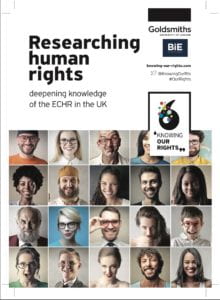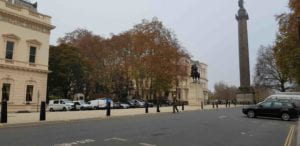

27 November 2018, 9 am. An early start, at a wonderfully festive British Academy, for our Knowing Our Rights symposium on What has the European Convention on Human Rights ever done for the UK. The symposium offered an opportunity to celebrate the twentieth anniversary of the Royal Assent of the Human Rights Act (9 November 1998).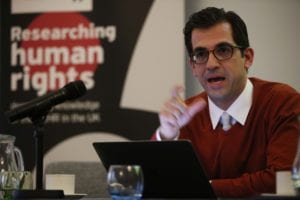
Prof Dimitrios Giannoulopoulos (Goldsmiths), opening up the symposium: Knowing Our Rights’ aim is to raise awareness of, and empower our young people to engage with, fundamental human rights in the UK. Our engagement with sixth formers across London and the UK serves this purpose […] The symposium will allow us to take stock of the impact of the ECHR in the UK.
The first panel explored equality, privacy and freedom of expression.
Prof 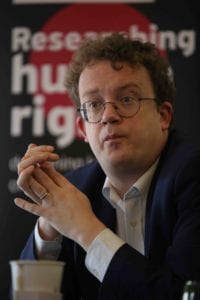 Colm O’Cinneide (UCL): Article 14 has proved to be more important than had been widely assumed at the time of the HRA’s enactment. In contrast, the common law has always been equality-light – and discrimination legislation has no special constitutional status.
Colm O’Cinneide (UCL): Article 14 has proved to be more important than had been widely assumed at the time of the HRA’s enactment. In contrast, the common law has always been equality-light – and discrimination legislation has no special constitutional status.
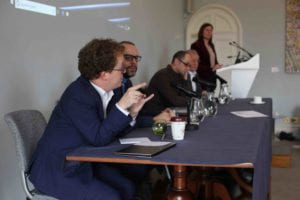
from left to right: O’Cinneide, Kagiaros, Johnson, Petley and Amos, discussing the right to life, sexual orientation equality, the right to privacy and freedom of the press.
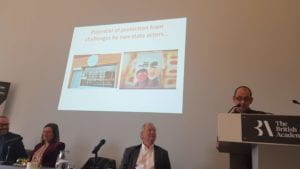 Prof Paul Johnson (York), discussing sexual orientation equality in the UK: Establishing that “gay rights” are “human rights” in the UK, by means of the ECHR, has often been a long, hard struggle […] It is easy to forget that the legal protections people take for granted today were so hard fought, and so recently fought […] The ECHR system is vital to ensure that gay men and lesbians complete the journey to full legal equality.
Prof Paul Johnson (York), discussing sexual orientation equality in the UK: Establishing that “gay rights” are “human rights” in the UK, by means of the ECHR, has often been a long, hard struggle […] It is easy to forget that the legal protections people take for granted today were so hard fought, and so recently fought […] The ECHR system is vital to ensure that gay men and lesbians complete the journey to full legal equality.
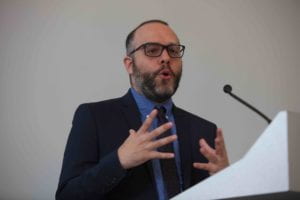 Dr Dimitrios Kagiaros (Exeter) on Art 8 ECHR and state surveillance of private electronic communications: The ECHR ensured that the United Kingdom’s surveillance regime would be subject to the rule of law and, following the enactment of the Human Rights Act 1998, individuals could seek redress for violations of rights perpetrated by the services before UK judges.
Dr Dimitrios Kagiaros (Exeter) on Art 8 ECHR and state surveillance of private electronic communications: The ECHR ensured that the United Kingdom’s surveillance regime would be subject to the rule of law and, following the enactment of the Human Rights Act 1998, individuals could seek redress for violations of rights perpetrated by the services before UK judges.
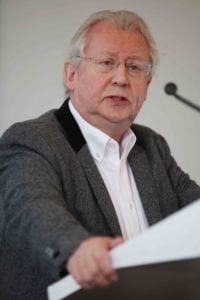
Prof Julian Petley
Prof Julian Petley (Brunel), reflected on the British press’ anti-juridicalism, how it has been extended to Europe and the ECHR, and why ECHR matters in providing protection against the press snooping on our private lives.
The second panel discussed the right to life and freedom from torture. Dr Natasa Mavronicola (Birmingham): Art 3 ECHR is a leading light in the elaboration of what the prohibition of torture and other ill-treatment demands as a matter of international law […] Those who are demonised, stigmatised, marginalised, or otherwise ‘othered’ in Brexit UK are better off with Article 3 than without it. Prof Merris Amos (QMU) on Art 2 ECHR: The ECtHR’s development of the positive duty to protect life has done an enormous amount for UK victims and families – an important example of what can be achieved when a state set in its ways is forced to adopt and adapt to international standards.

from left to right: Prof Merris Amos, Shoaib Khan (SMK solicitors and HRLA) and Dr Natasa Mavronicola
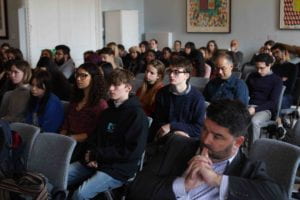
The symposium brought together human rights scholars, domestic and international legal experts, as well as a number of sixth form students, including from Brighton & Hove Sixth Form College and Varndean College in Brighton.
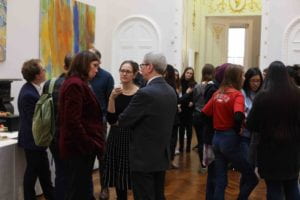
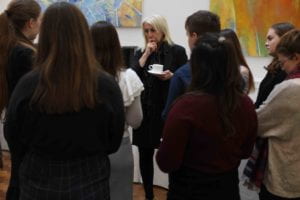
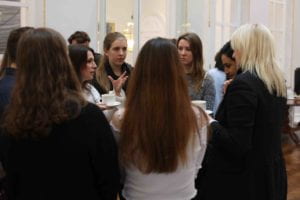
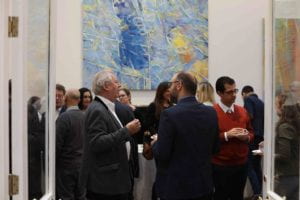
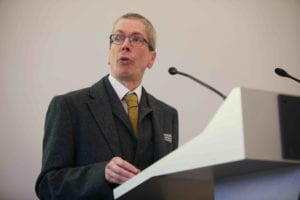
The next panel focused on liberty, fair trials and freedom of religion. Dr Ed Bates (Leicester): The right to liberty and the safeguards surrounding it would traditionally be regarded as a rock solid feature at the core of the UK legal tradition […]. A number of examples, however, demonstrate that the ECHR has subjected the common law to some doses of common sense.
 Prof Dimitrios Giannoulopoulos (Goldsmiths), on the effect of Art 6 ECHR on police investigations and the pre-trial phase: ECHR jurisprudence has reinforced UK human rights guarantees indispensable to a fair trial, such as the right to custodial legal assistance and wider privilege against self-incrimination or the right not to be subjected to unlawful entrapment, and came to the support of the common law in prohibiting the use of third party torture evidence. At the same time, the Court exhibited the ability to accommodate more idiosyncratic elements of domestic criminal procedure, even where it might a priori appear difficult to square them with the Court’s raison d’etre, as the guarantor of fundamental human rights; its jurisprudence on drawing adverse inferences from the exercise of the right to silence offers a good illustration.
Prof Dimitrios Giannoulopoulos (Goldsmiths), on the effect of Art 6 ECHR on police investigations and the pre-trial phase: ECHR jurisprudence has reinforced UK human rights guarantees indispensable to a fair trial, such as the right to custodial legal assistance and wider privilege against self-incrimination or the right not to be subjected to unlawful entrapment, and came to the support of the common law in prohibiting the use of third party torture evidence. At the same time, the Court exhibited the ability to accommodate more idiosyncratic elements of domestic criminal procedure, even where it might a priori appear difficult to square them with the Court’s raison d’etre, as the guarantor of fundamental human rights; its jurisprudence on drawing adverse inferences from the exercise of the right to silence offers a good illustration.
Prof Javaid Rehman, UN Special Rapporteur on Human Rights in Iran, addressed freedom of religion and ECHR jurisprudence.
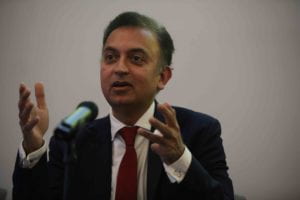
In addition to illustrating the wide-ranging effect of ECHR case law in the UK, the symposium changed its perspective, to look from the reverse angle, at how UK case law had affected the development of ECHR jurisprudence.
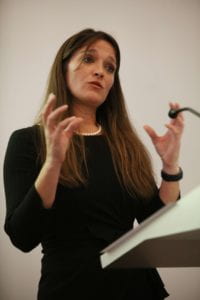 Eleanor Hourigan, the Counsel to the Joint Committee on Human Rights, took a historic perspective as her starting point: Many of the ECHR’s provisions are inspired from UK common law principles e.g. the right to a fair trial or habeas corpus; the UK had played an active role in all Council of Europe bodies working on the Convention, heavily influencing their operation and thinking through participation in debates and discussions on the functioning of the system; and UK lawyers take many cases to Strasbourg, so the UK reasoning is frequently heard and understood there […] There are also significant opportunities for more or less structured exchanges between ECtHR and UK judges, and judicial dialogue in the form of judgments of course, which improve judicial mutual-understanding.
Eleanor Hourigan, the Counsel to the Joint Committee on Human Rights, took a historic perspective as her starting point: Many of the ECHR’s provisions are inspired from UK common law principles e.g. the right to a fair trial or habeas corpus; the UK had played an active role in all Council of Europe bodies working on the Convention, heavily influencing their operation and thinking through participation in debates and discussions on the functioning of the system; and UK lawyers take many cases to Strasbourg, so the UK reasoning is frequently heard and understood there […] There are also significant opportunities for more or less structured exchanges between ECtHR and UK judges, and judicial dialogue in the form of judgments of course, which improve judicial mutual-understanding.
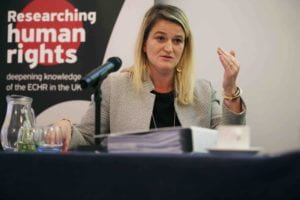 Clare Brown, from the department of the execution of judgments at the Council of Europe, spoke about the UK’s implementation record, asking whether it had been a successful example of shared responsibility for the Convention.
Clare Brown, from the department of the execution of judgments at the Council of Europe, spoke about the UK’s implementation record, asking whether it had been a successful example of shared responsibility for the Convention.
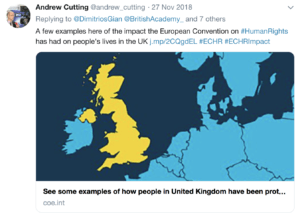 Andrew Cutting, at the Council of Europe, intervened via twitter to point the symposium towards a new CoE resource illustrating the ECHR’s impact across Europe, with a number of examples taken from the UK.
Andrew Cutting, at the Council of Europe, intervened via twitter to point the symposium towards a new CoE resource illustrating the ECHR’s impact across Europe, with a number of examples taken from the UK.
Philip Leach (Middlesex), who was scheduled to speak on the right to life, and whose flight from Strasbourg was unfortunately delayed, also intervened via twitter, with a quick message of support for the ECHR.
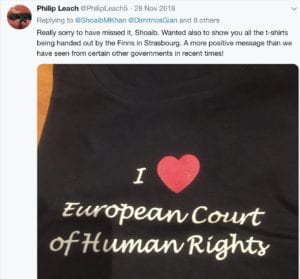
The symposium came to an end with a keynote address by Prof Conor Gearty (LSE), on ‘States of denial: what the search for a new Bill of Rights tells us about post-Brexit rights protection’. The keynote speech was chaired by Goldsmiths Visiting Professor in Law, Sir Geoffrey Nice QC.
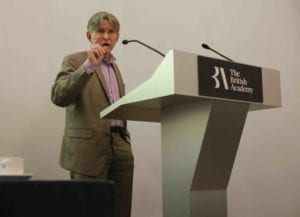
A big thanks to the Human Rights Lawyers’ Association, and Mr Shoaib Khan, for supporting the symposium, and ongoing collaboration.
The Knowing Our Rights research project feeds into the LLB Law programme at Goldsmiths, including the Human Rights Law (with Goldsmiths’ Human Rights Clinic) module in the final year of the degree. Students undertaking this module have the opportunity to participate in Knowing Our Rights research events, undertake relevant human rights research and participate in human rights workshops in sixth forms across London, among other activity.
